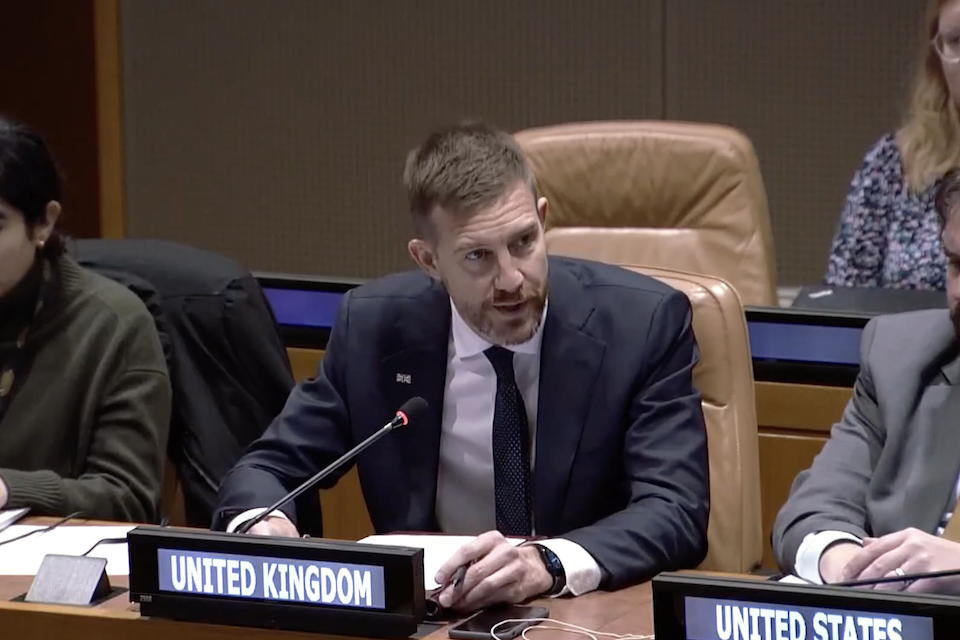We must continue strengthening implementation of the Chemical Weapons Convention: UK Statement at the Security Council
Statement delivered by Thomas Phipps at UN Security Council Arria Meeting on the Organization for the Prohibition of Chemical Weapons

I am going to speak along the same lines as the majority of colleagues here today and so in that respect I am sure I will say nothing that you do not expect.
Russia’s efforts to undermine the integrity of the OPCW over the last decade are almost as egregious as its own repeated use of chemical weapons.
No one is fooled by today’s charade. Your choice of briefers, your denial of the Syrian regime’s repeated chemical weapons use, your attacks on the OPCW’s work, your recent refusal to engage in Council meetings on Syria chemical weapons, all lay bare your cynicism in organising an event that purports to address “the OPCWs diminishing authority”.
The vast majority of the international community understands that it is you that has worked to undermine the OPCW.
Colleagues, the Chemical Weapons Convention and work of the OPCW is too important for us to allow the Russian Federation to succeed.
In 1988, eight years after diplomatic negotiations on the Convention began, Saddam Hussein’s Iraq Army conducted a chemical weapons attack on the village of Halabja, which killed between 3,000 and 5,000 people. The horror of the deaths of these thousands of civilians brought increased urgency to efforts to secure a commitment by states to never, under any circumstances, develop, produce, acquire, stockpile, transfer, or use chemical weapons.
Twenty years after the Convention was opened for signature in Paris, the Assad regime released the nerve agent Sarin in the Ghouta district of Damascus, killing more than 1400 people, many of them children. Despite the adoption by consensus in 2013 of resolution 2118, the Syrian regime did not destroy its chemical weapons stocks and the Council continues to discuss the gaps and inconsistencies in Syria’s initial declaration. We know the Assad regime went on to use chemical weapons on numerous occasions, including in Douma in 2018.
And it is worth reminding ourselves that the Douma attack took place one month after three Russian nationals, Alexander Petrov, Ruslan Boshirov and Sergey Fedotov were involved in an assassination attempt using a Novichok nerve agent in the UK. A similar Novichok nerve agent was used by Russia’s Federal Security Service in an attempt to assassinate Alexei Navalny.
In response to these repeated chemical weapons attacks, states from across the globe - from Asia, Africa, Europe, Latin America – have worked together to strengthen the OPCW. After Russia used its veto to block a joint UN-OPCW inquiry into who was responsible for chemical weapons attacks in Syria, States Parties voted to give the OPCW attribution powers. The OPCW IIT has subsequently found the Syrian regime responsible for 5 CW attacks.
And I would encourage all colleagues, my Brazilian colleague in particular, to read in detail the latest IIT report on the attack in Douma. Mr. Aaron Maté made various claims today in this meeting. One of which, which he focused on at length, was the issue of foaming at the mouth and whether it can be caused by chlorine. He said quite clearly the IIT does not address this issue in its report. That is simply not true. It does so directly on page 43 of the report under section six point 106. I encourage you to also look online, look at very clear successful attempts that have been made to counter the claim Mr Maté continues to make.
So colleagues, let’s be clear, it is not diminishing OPCW authority that concerns Russia. Quite the opposite. It is the strengthening of the OPCW’s authority that Russia fears.
There is one point in the concept note for this event with which we strongly agree. The RevCon in May is an important moment. We must use it to continue strengthening implementation of the Chemical Weapons Convention. And with the ongoing support of the Security Council we must collectively address the problem of undeclared programmes, which has been highlighted by repeated Syrian and Russian chemical weapons use over recent years.